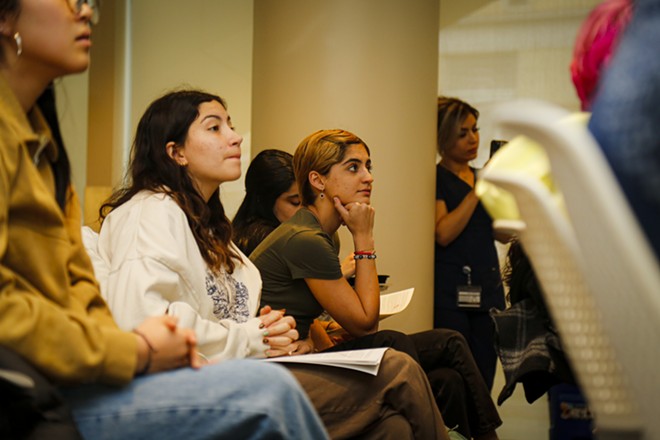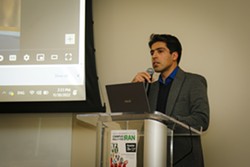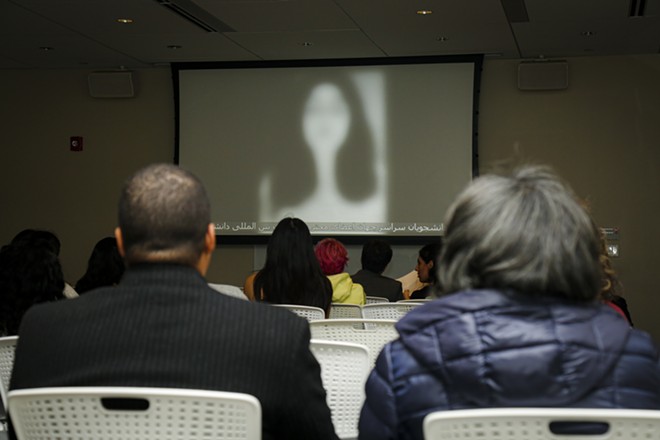
Mark Oprea
Case students listen to a presentation at Wednesday's Rally For Iran, a call-to-action hosted by Payam Fadaei and Ghazaal Tahmasebi, two PhD students.
When protests first erupted across Iran in September, after the death of 22-year-old Masha Amimi, Payam Fadaei was relatively uninvolved with social justice. He never, he admits, really considered himself activist material.
But then the reports came out.
Amini, who was found dead in a hospital in Tehran on September 16th, was not just a victim of a coma-induced heart attack. For violating the conservative morality police's hijab code, Amini was, eyewitnesses testified, bludgeoned to death by Tehran officers.
Then, 451 protestors were killed, and 18,000 were jailed.
Fadaei, a first-year PhD student in mechanical engineering, felt pushed to do something, anything, on campus.
"I had to," he said. "There is a brutal regime who is doing unacceptable things do our women. That's why I had to take my time, instead of doing research."
On Wednesday, Fadaei hosted a Rally For Iran in a presentation room at Case Western's Tinkham Veale University Center. With roughly 50 in attendance, the two-hour presentation spotlighted both the current atrocities of the Iranian police force and the growing global movement to call attention to the plight of Iranian women.

Mark Oprea
Payam Fadaei, a PhD student at Case Western Reserve, speaks at the Rally For Iran he hosted on Wednesday.
The rally was also a window into American academia's take on what experts say is a movement as momentous as the Iranian Revolution in 1979, a global-reaching uprising that toppled Iran's monarchy. The tones and language used by Fadaei and fellow presenters echoed phrasings and sentiments by the Black Lives Matter movement, or the protests following the 2018 murders at the Paris satire publication Charlie Hebdo.
"Many girls in Iran are saying, 'I'm the voice of Masha.' That's what they're saying," Fadaei said from a podium. "Boys are encouraged to be judges, to ride their bikes—but girls, girls are not allowed to do that. There are simple things not in their control."
Ghazaal Tahmasebi, a PhD student in neuroscience at Case who aided Fadaei in Wednesday's rally, said her aim was to inform other students, and Clevelanders in general, about the personal connection many Iranian-Americans like herself have to Amini's murder. It's why she started by showing a video of partnering university coalitions—of women "tying their hair up" in pure rejection of the "compulsory hijab."

Mark Oprea
Attendees watch a video of an anonymous Iranian girl, addressing today's violence and injustices.
It's a connection Tahmasebi struggles to discuss without bouts of anger and frustration. Although she texts regularly with friends, and fellow activists, in Tehran through WhatsApp, a September Internet blockade is making reliable contact nearly impossible.
"I'm still shocked, like it's shocking, right?" Tahmasebi, who left Tehran to attend Case, said outside the presentation room. "Many of [my friends] are facing a death penalty. We don't know what will happen to them."
She added: "That's why I wanted to talk."
Since the details of Amini's death, Iranians around the globe have dealt with a stiff cultural confrontation. In defiance, many Iranians rooted against their team in the World Cup, though the team showed solidarity with the movement by refusing to sing the national anthem in its first game. Even the family of Iran's Supreme Leader Ayatollah Ali Khamanei urged sympathizers to support protestors.
"I ask the conscientious people of the world to stand by us," Farideh Moradkhani, Khamanei's niece, said in a video statement. "And ask their governments not to react with empty words and slogans but with real action and stop any dealings with this regime."
For Tahmasebi, who first left Iran when she was a teenager, the inability to protest Amini's death at home is debilitating.
Yet, like many Iranian academics studying, working abroad, a faraway cultural connection sparks good memories.
In fact, two nights before the rally, Tahmasebi wrote a poem—for both Amini and for her own reminder of Iranian resilience.
To the crowd, she read in Farsi:
I swear by the oppression brought by womanhood
Transcend all those days lost in deep sleep
Transcend all the stressful moments
From the collar of captivity
toward the crave for life
Coming soon: Cleveland Scene Daily newsletter. We’ll send you a handful of interesting Cleveland stories every morning. Subscribe now to not miss a thing.
Follow us: Google News | NewsBreak | Instagram | Facebook | Twitter

